Speech and debate championships represent the pinnacle of intellectual athletic achievement—moments when hundreds of hours of research, preparation, and practice converge in performances that demonstrate critical thinking, persuasive communication, and competitive excellence under pressure. These championship victories in forensics competitions define programs, inspire teammates, and create legacies that shape school culture for years to come. Yet after tournament awards ceremonies conclude and trophies return to campus, many schools struggle to appropriately honor these extraordinary academic achievements through recognition that matches their significance.
Traditional recognition approaches often fall short of celebrating forensics excellence adequately. Trophy cases become crowded with decades of awards competing for limited visibility. Championship announcements fade quickly from morning bulletins and school newsletters. Static plaques provide minimal context about the tournaments, topics debated, or competitive journeys behind victories. Meanwhile, incredible championship moments—final round speeches, tournament brackets, research dedication, and team collaboration—remain undocumented beyond fading memories and scattered photographs.
This comprehensive guide explores evidence-based strategies for creating speech and debate championship recognition that properly celebrates competitive excellence, preserves program legacy, and inspires future forensics champions through modern recognition solutions combining traditional elements with innovative digital technologies that transform how schools honor their greatest academic competitive achievements.
Effective championship recognition extends far beyond displaying trophies—it creates comprehensive systems documenting complete championship stories, celebrating individual and team contributions, and building forensics traditions that strengthen program culture while demonstrating institutional commitment to intellectual competition. Schools that excel at debate recognition create environments where academic competitive achievement receives the prominence and permanence these accomplishments deserve.
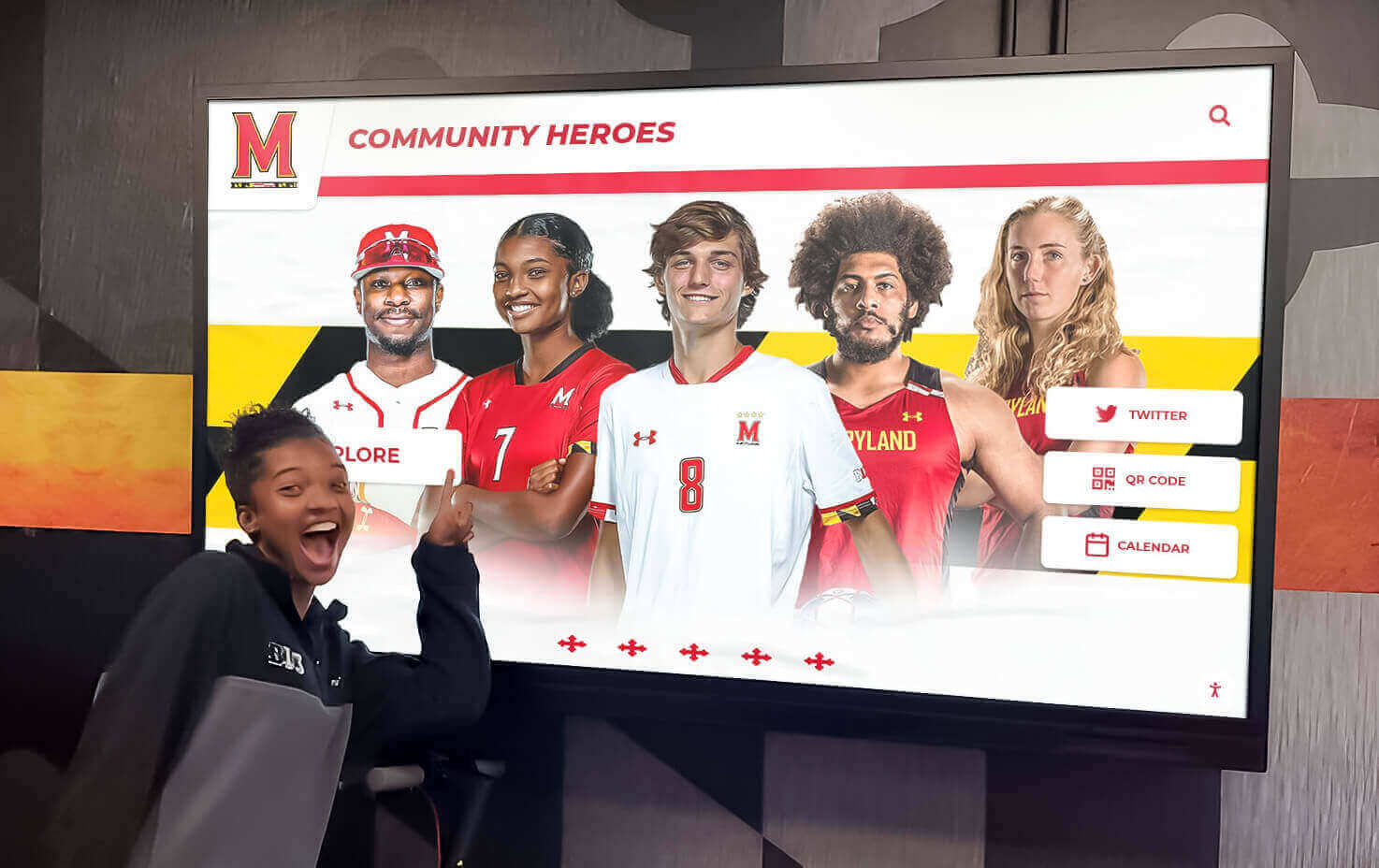
Modern recognition displays make speech and debate achievements visible and celebrated throughout the school community
Understanding Speech & Debate Championships and Their Significance
Before implementing recognition strategies, schools benefit from understanding the competitive landscape and why these accomplishments deserve comprehensive celebration comparable to athletic championships.
The Competitive Structure of Speech and Debate
Speech and debate, also known as forensics, encompasses diverse competitive events requiring distinct skill sets and preparation approaches.
Major Debate Formats
Debate events involve structured argumentation with specific formats and rules:
- Policy Debate (CX): Two-person teams debate year-long topics with in-depth research and rapid delivery
- Lincoln-Douglas Debate (LD): Individual values-based philosophical debate emphasizing ethics and moral reasoning
- Public Forum Debate (PF): Team debates on monthly current events topics accessible to general audiences
- Congressional Debate (Congress): Legislative simulation where students debate bills and resolutions in Senate/House format
- World Schools Debate: International format emphasizing impromptu argumentation and global perspectives
Each format demands different preparation strategies, research depths, and performance skills, making success in any format worthy of recognition.
Individual Speech Events
Speech competitions showcase diverse communication and performance abilities:
- Extemporaneous Speaking: Students analyze current events questions with minimal preparation time
- Original Oratory: Persuasive speeches on topics students select and develop
- Interpretation Events: Dramatic, humorous, or duo performances of published literature
- Informative Speaking: Educational presentations demonstrating research and communication excellence
- Impromptu Speaking: Speeches delivered with very limited preparation on quotations or topics
The breadth of event categories means championship recognition must accommodate diverse competitive achievements across multiple disciplines.
Learn about comprehensive approaches in academic recognition programs that celebrate diverse intellectual achievements.
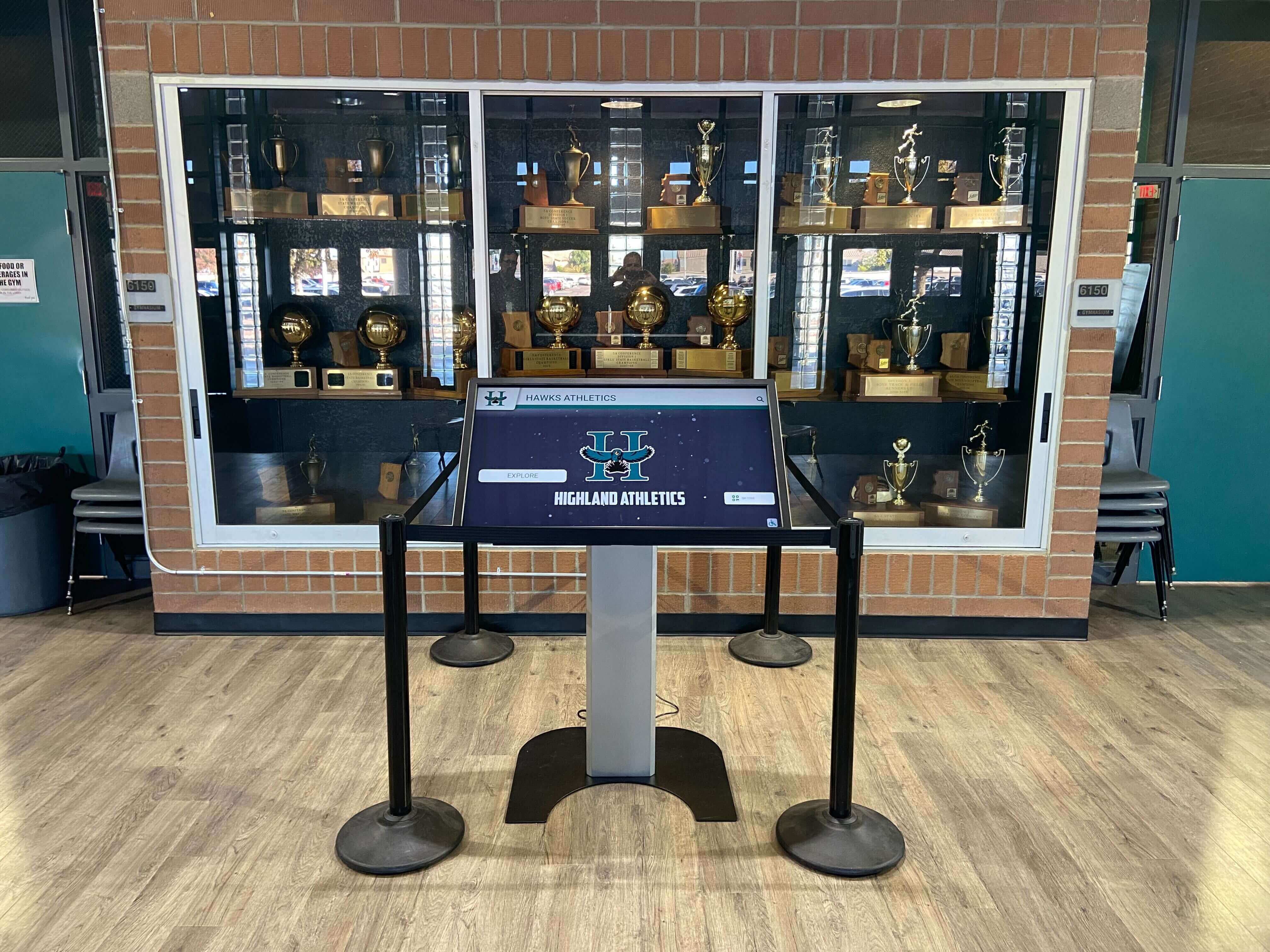
Modern displays integrate digital storytelling with traditional trophy presentations for comprehensive championship celebration
The Tournament Hierarchy and Championship Levels
Speech and debate competitions operate on tiered systems with increasing prestige at higher levels.
Local and Invitational Tournaments
Weekend tournaments hosted by schools and leagues provide regular competition opportunities where students develop skills, test arguments, and qualify for championship events. Success at invitational tournaments, particularly prestigious competitions at Stanford, Harvard, Yale, and other major universities, builds competitive credentials.
State Championships
State forensics associations organize annual championship tournaments determining state-level supremacy in each event category. State champions represent the highest achievement within their geographic region, with top-placing students earning State Champion designations in their respective categories.
According to the Colorado High School Activities Association, state championship tournaments feature the season’s best competitors across multiple classification levels, with Class 5A tournaments alone including hundreds of competitors from dozens of schools.
District and National Qualifying Tournaments
The National Speech & Debate Association (NSDA) operates district tournaments where students must qualify for the National Tournament through competitive performance. District qualification represents significant achievement demonstrating sustained excellence throughout the season.
National Championships
The NSDA National Tournament, held annually since 1931, represents the largest academic competition in the world. According to the NSDA, more than 6,000 middle and high school students compete each June, with national champions representing the absolute elite of high school forensics. Since 2000, states like Minnesota have established dominant programs winning more than 43 national championships in main events.
This hierarchical structure means schools may recognize achievements at multiple championship levels—from state titles to district qualification to national finals appearances—each deserving appropriate celebration relative to competitive difficulty.
Why Speech & Debate Championships Matter Beyond Competition
Championship achievements in forensics represent far more than tournament victories—they demonstrate qualities predicting success across all life domains.
Development of Critical Transferable Skills
Speech and debate competitors develop exceptional research abilities analyzing complex policy and philosophical topics, critical thinking skills evaluating evidence and constructing logical arguments, public speaking confidence communicating persuasively to diverse audiences, time management balancing preparation with academic demands, and intellectual flexibility adapting to opponent arguments and judge preferences.
These capabilities serve students throughout college and career, making forensics achievement meaningful beyond tournament success.
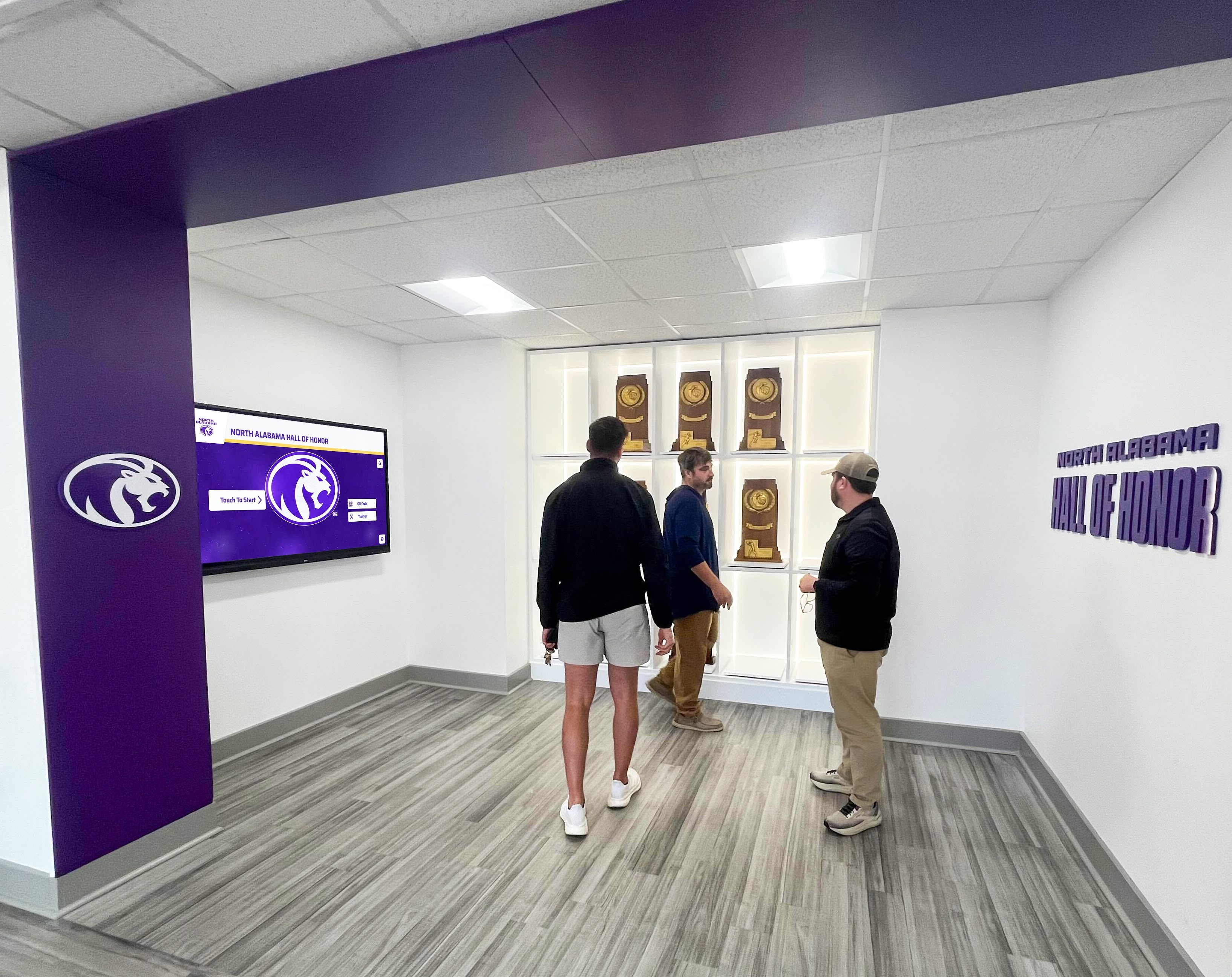
Championship displays create destinations where community members connect with academic excellence and program tradition
College and Career Advantages
Championship forensics credentials significantly strengthen college applications, demonstrating intellectual rigor and competitive excellence that admissions offices value. Many students receive substantial forensics scholarships at colleges with debate programs, while the communication and analytical skills developed through competition provide advantages across all academic disciplines and career paths.
Personal Growth and Character Development
The competitive forensics journey builds resilience through inevitable losses and setbacks, confidence from performing under pressure in front of judges and audiences, work ethic through preparation demands, and emotional intelligence from competitor relationships and coaching feedback.
Explore comprehensive student achievement approaches in outstanding students honor wall guide that celebrate intellectual excellence.
Creating Comprehensive Championship Recognition Programs
Effective recognition programs honor speech and debate champions while building broader forensics program culture and motivating developing competitors.
Immediate Recognition Strategies
When students achieve championship success, timely recognition maximizes impact and demonstrates institutional appreciation for academic competition.
Multi-Channel Announcements and Celebration
Announce championship achievements through diverse communication channels reaching varied audiences:
- Morning announcements detailing specific tournaments, events, and competitive achievements
- School website homepage features with photos and championship context
- Social media posts celebrating accomplishments with tournament details
- Electronic marquee displays showcasing forensics champions
- Email communications to families and broader school community
- Local media press releases extending recognition beyond campus
- District communications highlighting program excellence
Create announcement content providing context beyond names—share the specific debate format or speech event, tournament prestige level, competitive field size, and qualification implications for higher-level competitions.
Recognition Ceremonies and Honors
Host dedicated forensics honors ceremonies or incorporate championship recognition into existing school events:
- Special assembly celebrating championship achievements with context for non-forensics students
- Award presentations during school-wide academic recognition ceremonies
- Performance opportunities where champions present speeches or debate demonstrations
- Administrative congratulations from principals, superintendents, or school board members
- Certificate and trophy presentations commemorating specific achievements
- Family invitations ensuring supporters share celebration moments
- Media coverage documentation for future program promotion
Formal ceremonies provide institutional acknowledgment reinforcing that forensics championships represent major accomplishments worthy of school-wide celebration comparable to athletic success.
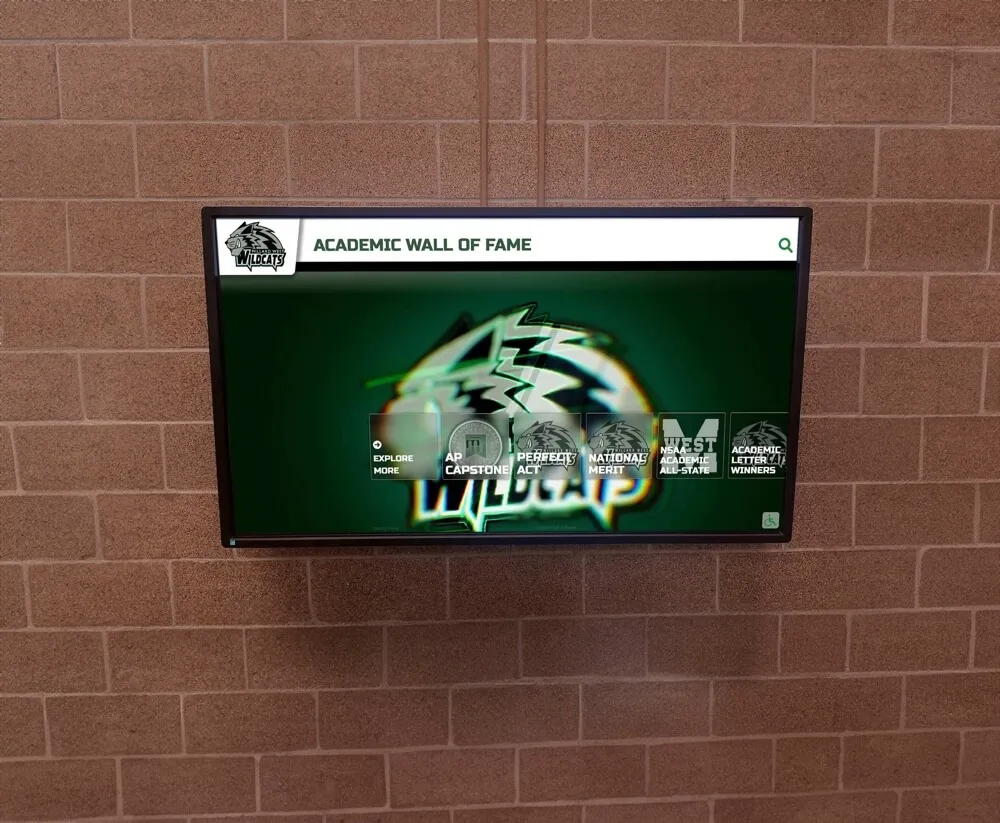
Prominent recognition displays demonstrate institutional commitment to celebrating intellectual competitive achievement
Permanent Recognition Displays
Temporary recognition fades quickly—permanent displays create lasting tributes honoring championship achievement for years while inspiring current and future competitors.
Traditional Physical Recognition Elements
Physical displays maintain visibility in speech and debate facilities and throughout campuses:
- Dedicated forensics championship walls showcasing tournament victories
- Trophy cases featuring state, national, and invitational championship awards
- Banner displays identifying championship years and event categories
- Photo galleries of championship competitors by tournament and year
- Hallway recognition in high-traffic areas maximizing visibility
- English department or academic wing displays connecting forensics to curricular programs
While traditional physical recognition provides value, space constraints limit comprehensive documentation, and updating static displays requires ongoing manual effort that often falls behind current achievements.
Modern Digital Recognition Solutions
Digital recognition platforms transform forensics championship celebration by eliminating traditional limitations while enabling rich multimedia documentation. Solutions like Rocket Alumni Solutions enable schools to showcase unlimited competitors across all tournaments and years without physical space constraints.
Digital platforms provide capabilities impossible with static displays:
- Unlimited Recognition Capacity: Honor every championship achievement throughout program history without removing past honorees
- Rich Multimedia Documentation: Include photos, speech videos, debate round recordings, tournament brackets, research topics, and achievement narratives
- Interactive Exploration: Enable students and visitors to search by tournament, event type, year, or competitor name
- Simple Cloud-Based Updates: Add new championships remotely through intuitive interfaces without physical display modifications
- Web and Mobile Access: Extend recognition beyond campus through online platforms families can access and share globally
- Comprehensive Analytics: Track engagement revealing which content resonates most with audiences
Learn about modern recognition technology in digital hall of fame touchscreen guide demonstrating platforms specifically designed for educational achievement celebration.
Recognition That Documents Complete Competitive Journeys
The most impactful recognition extends beyond listing tournament results—it preserves the preparation, dedication, and stories behind championship performances.
Individual Competitor Achievement Profiles
Create comprehensive profiles for each championship competitor including:
- High-quality photos showing students in competitive settings
- Specific tournaments won and event categories mastered
- Competitive journey documenting progression from novice to champion
- Notable round victories and elimination bracket progression
- Research approach and preparation strategies
- Coaching acknowledgment and teammate contributions
- Post-graduation outcomes including college choices and continued forensics participation

Individual recognition profiles celebrate complete competitive journeys and strategic approaches
Performance and Competition Documentation
Preserve competitive excellence through multimedia content:
- Video recordings of championship final rounds and elimination debates
- Speech performance recordings from state and national competitions
- Tournament bracket documentation showing competitive paths to championships
- Evidence files and research documentation demonstrating preparation depth
- Judge feedback and ballot comments providing performance insights
- Team preparation footage showing research sessions and practice rounds
- Post-tournament reflection interviews with competitors and coaches
This documentation enables community members to experience the intellectual excellence these students achieved, not merely read about tournament results. It also provides invaluable learning resources for current competitors studying championship-level performance.
Explore strategies in classroom projects recognition display guide that document comprehensive achievement journeys.
Building Forensics Program Recognition Beyond Championships
Comprehensive recognition celebrates excellence at multiple achievement levels, not only pinnacle accomplishments, creating motivation pathways for competitors at all experience stages.
Tiered Recognition Structures
Creating multiple recognition levels ensures acknowledgment opportunities exist for students at different competitive development stages.
Elite Championship Recognition
Highest-level honors for exceptional tournament achievement:
- State championship victories in specific debate and speech events
- National tournament qualification through district competitions
- National championship elimination round appearances and victories
- Tournament of Champions (TOC) qualification and success
- Prestigious invitational tournament championships at Stanford, Harvard, Yale, and similar competitions
- Season-long ranking achievements in NSDA national point standings
These achievements receive special ceremonies, permanent display prominence, and comprehensive celebration befitting their exceptional nature.
Competitive Excellence Recognition
Consistent performance acknowledgment across the season:
- District tournament finalist and semifinalist placement
- Invitational tournament elimination round advancement
- Speaker award recognition demonstrating presentation excellence
- Regular season tournament victories at local competitions
- Congressional Debate best speaker and presiding officer honors
- Consistent breaking (advancing to elimination rounds) across multiple tournaments
Progress and Participation Recognition
Growth-based acknowledgment ensuring all competitors find success opportunities:
- Novice tournament victories and improvement milestones
- First elimination round break after seasons of preliminary round competition
- Event expansion as competitors master additional formats
- Research contribution recognition for team preparation support
- Tournament participation consistency demonstrating commitment
- Peer coaching and mentorship contributions to program culture
This tiered approach maintains prestige for championship achievements while ensuring recognition opportunities exist for forensics students at all skill levels, creating inclusive program cultures where everyone finds motivation to improve.
Learn about multi-level recognition in academic honor roll recipients recognition guide that celebrates achievement diversity.
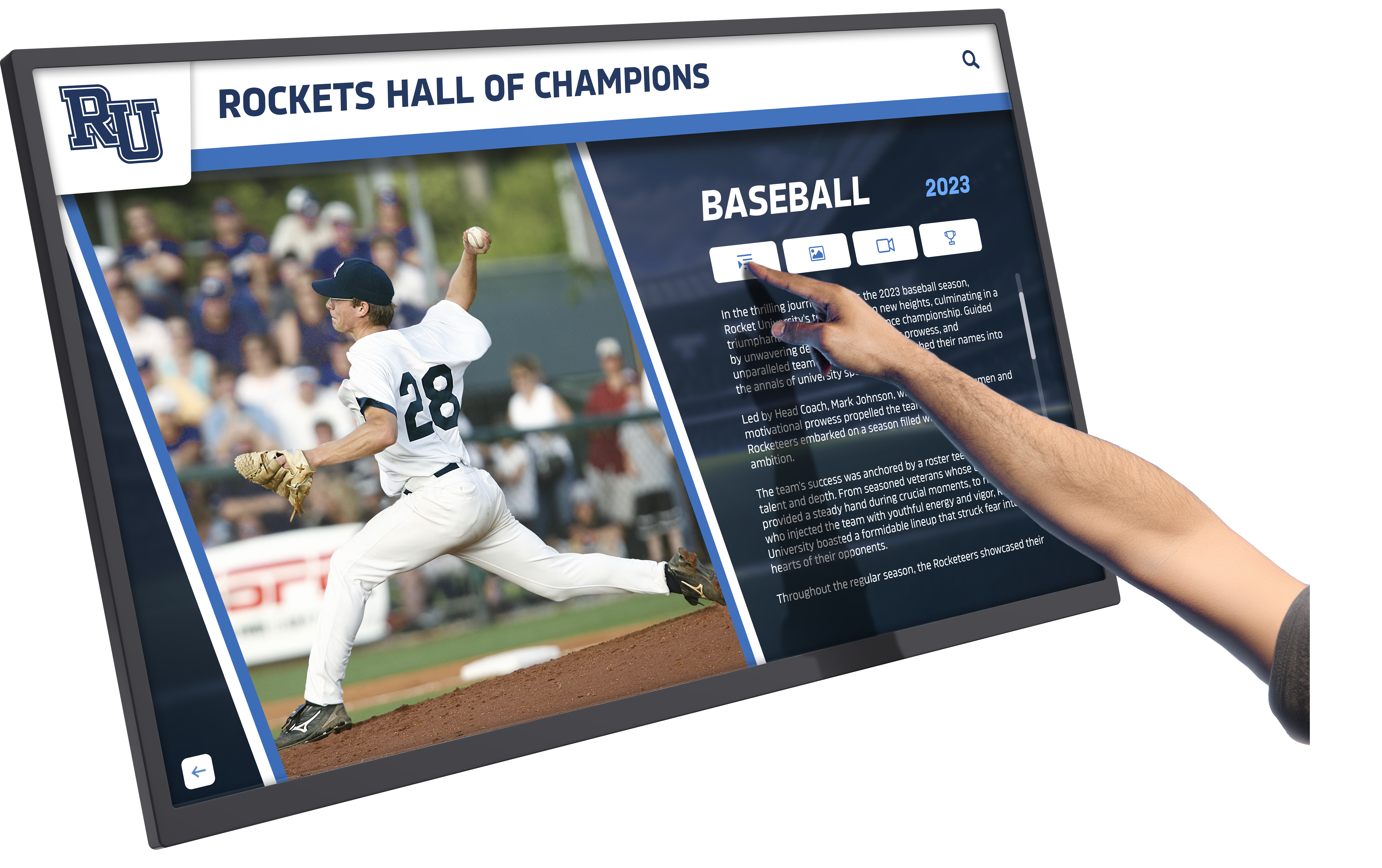
Touchscreen interfaces enable intuitive exploration of forensics achievements and competitive histories
Event-Specific Recognition Categories
Comprehensive recognition celebrates diverse accomplishments across different debate formats and speech categories.
Debate Format Recognition
Acknowledge excellence across distinct debate disciplines:
- Policy Debate championship recognition including research depth and strategic innovation
- Lincoln-Douglas Debate philosophical argumentation and values analysis excellence
- Public Forum Debate current events mastery and accessible communication
- Congressional Debate legislative excellence and chamber participation
- World Schools Debate impromptu argumentation and international format success
Each debate format requires different skill sets deserving distinct recognition that honors format-specific achievements.
Speech Event Category Recognition
Celebrate accomplishments across diverse speech competitions:
- Extemporaneous Speaking demonstrating current events analysis and quick preparation
- Original Oratory showcasing persuasive communication on student-selected topics
- Interpretation Events including dramatic, humorous, and duo performances
- Informative Speaking displaying research and educational presentation excellence
- Impromptu Speaking revealing adaptability and quick-thinking capabilities
Team Competition and Partnership Recognition
Honor collaborative excellence within inherently individual competition:
- Partnership success in Policy Debate and Public Forum team formats
- Team sweepstakes victories combining individual achievements into collective success
- Squad depth recognition when programs qualify multiple competitors to championships
- Coaching excellence acknowledgment for sustained program competitive success
- Manager and support role recognition for contributions enabling competitor success
This comprehensive approach ensures recognition spans the full breadth of forensics competition while honoring both individual and collective achievements.
Implementing Modern Recognition Technology for Forensics Programs
Traditional recognition approaches—printed programs, static plaques, and paper certificates—struggle to create the engagement and documentation modern forensics programs need.
Digital Recognition Display Systems
Digital recognition platforms transform championship celebration through interactive displays eliminating traditional limitations while enabling comprehensive documentation.
Key Advantages of Digital Forensics Recognition
Solutions designed specifically for educational recognition provide capabilities traditional methods cannot match:
Unlimited Recognition Capacity
Physical space no longer constrains championship documentation:
- Single display showcases unlimited competitors across all events, tournaments, and years
- No need to remove historical achievements when adding current champions
- Comprehensive archives preserve complete program competitive history
- All debate formats and speech events receive equal display capacity
Dynamic Multimedia Content Integration
Move beyond static photos and text to capture competitive excellence:
- Video documentation of championship speeches and debate rounds
- Audio recordings of extemp speeches and oratory performances
- Photo galleries showing tournament experiences and team dynamics
- Tournament bracket visualizations demonstrating competitive paths
- Research documentation revealing preparation approaches
- Judge feedback and ballot analysis providing performance insights
Interactive User Experience
Create engagement impossible with static trophy cases:
- Search functionality enabling visitors to find specific competitors, events, or years
- Filtering by debate format, speech category, tournament level, or achievement type
- Detailed competitor profiles documenting complete forensics journeys
- Timeline visualizations showing program evolution and championship frequency
- Comparative analysis tools exploring different championship teams and eras
- Social sharing capabilities allowing competitors and families to celebrate accomplishments online
These interactive capabilities create experiences where students, families, and visitors spend extended time exploring championship history rather than briefly glancing at trophy cases—significantly increasing recognition impact and program culture development.
Explore comprehensive platforms in interactive touchscreen displays school recognition guide designed specifically for academic achievement.
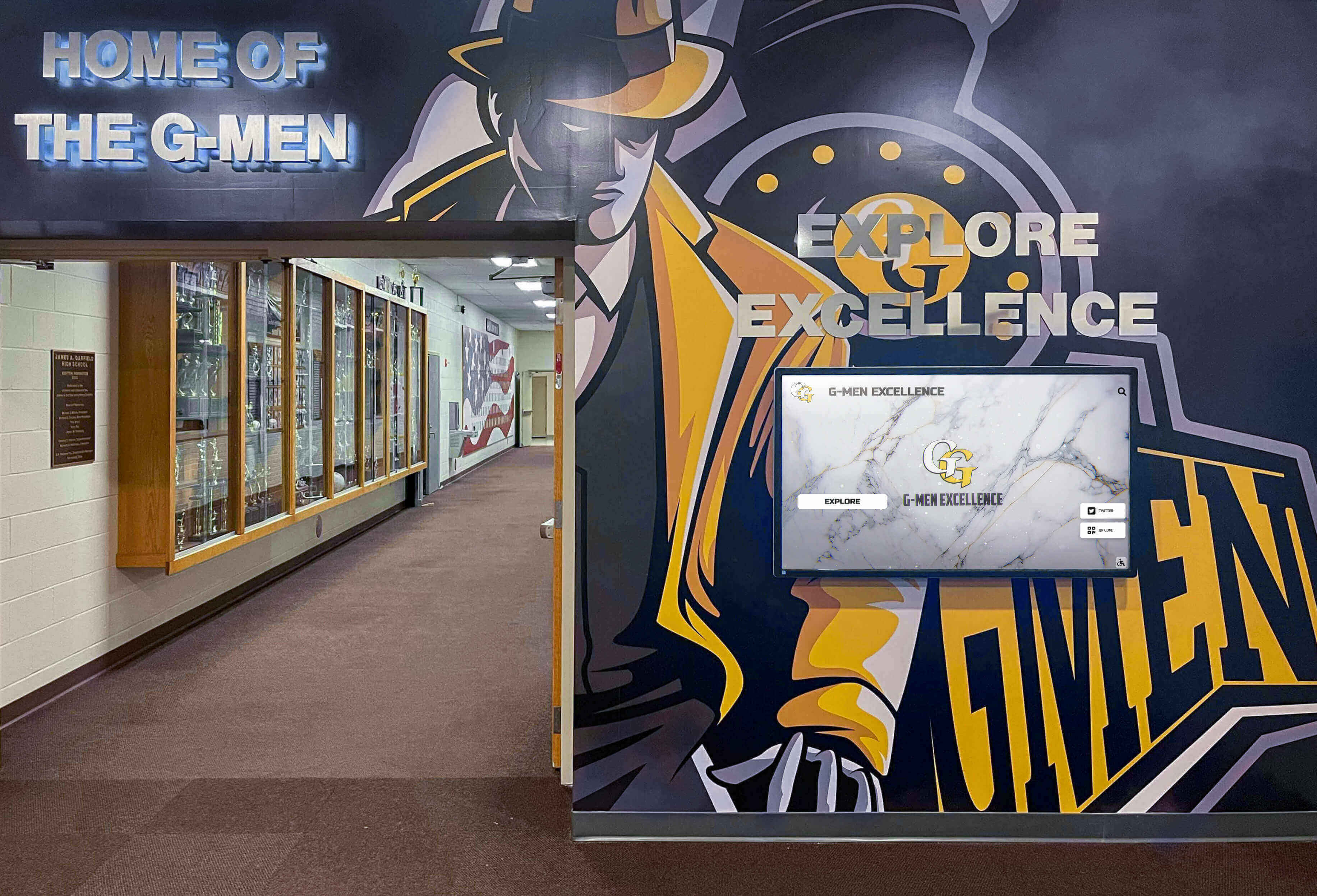
Integrated recognition combines championship trophies, visual elements, and digital displays in prominent locations
Strategic Placement for Maximum Impact
Championship display effectiveness depends heavily on strategic positioning maximizing visibility and demonstrating institutional priorities.
High-Traffic Location Selection
Place forensics recognition where diverse audiences encounter it regularly:
- Main building entrance lobbies ensuring all students and visitors see championship recognition
- English department areas connecting forensics to curricular communication emphasis
- Library or media center spaces frequented by academically engaged students
- Administrative corridors where district officials and community leaders visit
- Commons areas and cafeterias with extended daily student exposure
- Auditorium lobbies where performance events and assemblies create visibility opportunities
- Alumni centers connecting championship tradition to advancement programs
Multiple distributed locations ensure championship recognition reaches diverse audiences rather than limiting displays to single spaces only forensics students frequent. This broad visibility elevates program status while inspiring students in other academic areas to consider forensics participation.
Prominence Comparable to Athletic Recognition
Strategic placement should communicate that intellectual competitive achievement receives institutional respect equal to athletic success:
- Size and display quality matching athletic championship recognition
- Positioning in central locations rather than isolated academic wing corners
- Integration with school pride and identity displays
- Featured content in recruitment materials and campus tours
- Administrative messaging emphasizing forensics excellence alongside other achievements
This prominence demonstrates authentic institutional commitment to academic competition rather than token acknowledgment, significantly impacting program culture and community perception.
Learn about strategic recognition approaches in state championships display guide with principles applicable to forensics contexts.
Program Implementation and Sustainable Management
Successful forensics championship recognition requires systematic planning and manageable ongoing operation that survives coaching transitions and administrative changes.
Planning Phase Considerations
Current State Assessment
Schools should begin by comprehensively evaluating existing forensics recognition:
- Which championships currently receive recognition and which remain undocumented?
- Where are forensics displays located and who regularly encounters them?
- What information accompanies physical trophies (competitor names, tournament details, event categories)?
- How accessible are championship records and historical documentation?
- What condition are existing trophies, awards, and recognition elements in?
- Which stakeholders feel current recognition appropriately honors competitive achievements?
This assessment reveals gaps between current recognition and appropriate championship celebration while identifying starting points for improvement.
Recognition Objectives Clarification
Different stakeholders may have varying priorities requiring reconciliation:
- Inspiring current competitors by making championship legacy visible and tangible
- Honoring championship competitors through permanent appropriate recognition
- Recruiting prospective students by demonstrating program competitive excellence
- Engaging alumni through recognition connecting them to current programs
- Building community pride by celebrating academic competitive achievements
- Preserving institutional history documenting program evolution and excellence
- Supporting fundraising by demonstrating program quality worthy of investment
Clear objective prioritization enables design decisions aligning recognition systems with most important goals when resource limitations require tradeoffs.
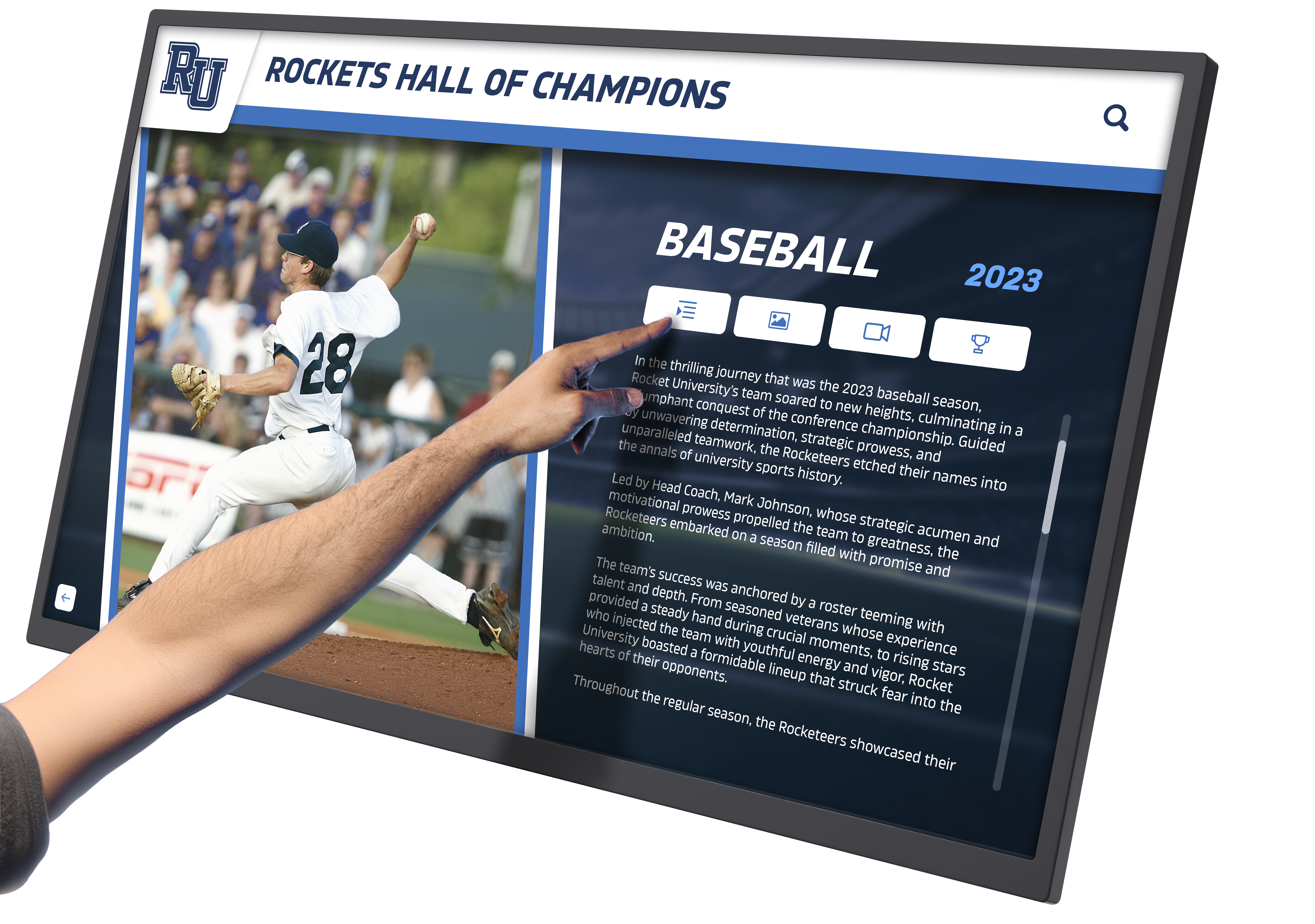
Purpose-built interfaces enable comprehensive exploration of forensics achievements and competitive journeys
Launch Strategy and Initial Implementation
Phased Implementation Approach
Begin with achievable recognition improvements building momentum:
- Start by documenting recent championships with readily available information
- Create simple digital or physical displays showcasing current season achievements
- Gradually expand historical documentation as archival research progresses
- Add multimedia elements as video and audio content becomes available
- Systematically increase recognition sophistication as budget and capacity allow
This phased approach demonstrates immediate progress while avoiding overwhelming initial resource demands that delay any implementation.
Technology Selection and Integration
When implementing digital recognition platforms:
- Evaluate hardware appropriate for placement locations and environmental conditions
- Select content management platforms matching staff technical capabilities
- Ensure web integration extending recognition beyond physical campus displays
- Consider comprehensive solutions like Rocket Alumni Solutions offering turnkey forensics recognition systems
- Train multiple staff members preventing knowledge concentration with single individuals
- Establish backup and succession plans ensuring sustainability through personnel changes
Historical Documentation Development
Many schools lack complete organized championship records requiring dedicated research efforts:
- Review team records, yearbooks, and archived materials for historical tournament results
- Contact former coaches who may retain comprehensive competition records
- Reach out to championship alumni for memories and personal documentation
- Consult state association archives for official state championship verification
- Research newspaper archives for contemporary tournament coverage
- Cross-reference multiple sources when conflicting information exists
This research often reveals championships undocumented in official records while providing rich stories and context enhancing recognition beyond simple tournament result listings.
Sustainability and Continuous Improvement
Ongoing Management Requirements
Assign clear responsibilities preventing recognition degradation:
- Designate specific staff members responsible for championship documentation updates
- Establish regular update schedules aligned with tournament calendars and competition seasons
- Create submission processes for competitors and coaches to provide achievement information
- Budget for ongoing technology subscriptions and hardware maintenance
- Train incoming staff members as coaching or administrative changes occur
- Document procedures ensuring institutional knowledge survives personnel transitions
Regular Assessment and Enhancement
Monitor recognition effectiveness enabling continuous improvement:
- Track which content generates highest engagement on digital platforms
- Gather feedback from competitors, families, and community members
- Monitor program participation and recruitment trends potentially influenced by recognition
- Assess recognition equity ensuring all event categories receive appropriate celebration
- Identify gaps in historical documentation requiring additional research
- Plan enhancements addressing identified opportunities and stakeholder needs
Regular assessment ensures recognition programs remain effective, comprehensive, and aligned with evolving program goals and community expectations.
Explore maintenance approaches in semester recognition highlights guide with strategies applicable to year-round forensics programs.
Maximizing Recognition Impact Through Storytelling
The most powerful recognition extends beyond tournament results—it captures the preparation, dedication, personal growth, and inspiring narratives behind championship achievement.
Capturing Competitive Journey Narratives
Competitor Perspective Stories
Interview championship forensics students about their experiences:
- Their forensics journey from initial participation to championship achievement
- Research and preparation strategies employed for different events
- Memorable rounds, arguments, or performances from championship tournaments
- Challenges overcome including tough losses and competitive setbacks
- Advice for younger competitors pursuing similar success
- How forensics participation influenced their personal development
- Future plans and how forensics skills transfer to college and career goals
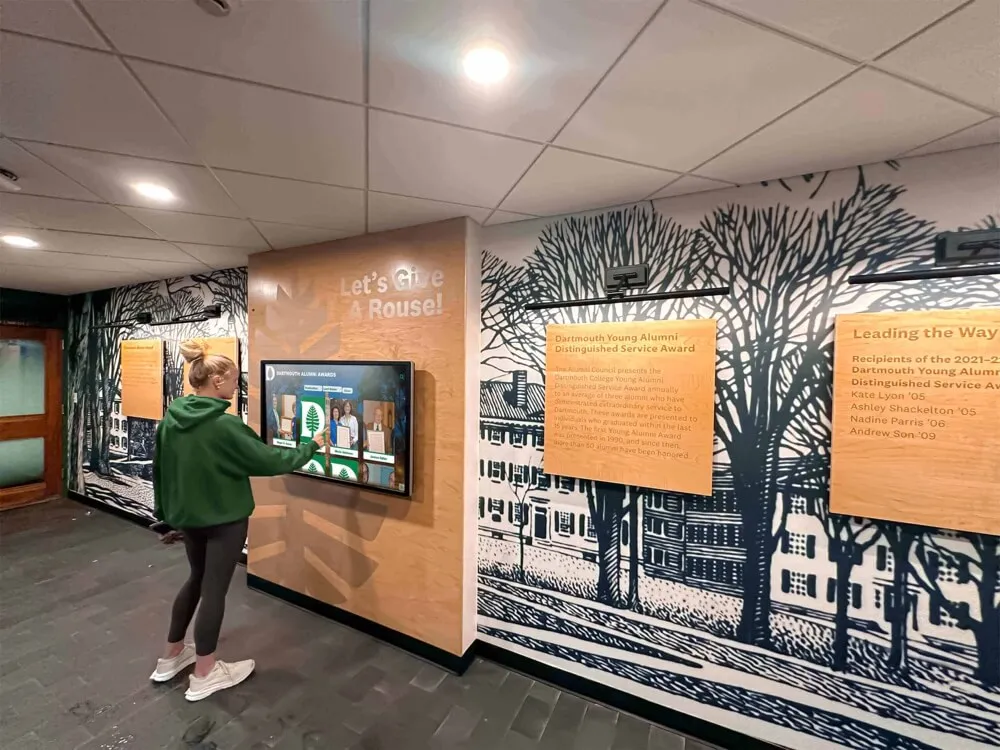
Strategic hallway placement ensures regular engagement with forensics recognition throughout daily school activities
These narratives humanize achievements while providing practical guidance for developing competitors studying championship-level success patterns.
Coach and Director Insights
Forensics educators provide valuable perspective:
- Competitor growth observed across seasons and skill development
- Specific qualities and work ethic leading to championship achievement
- Coaching approaches and preparation strategies supporting success
- Individual contributions to overall team competitive culture
- Impact of championship success on program development and community perception
- Legacy competitors leave within forensics program tradition
Coach perspectives validate student achievement while highlighting effective instructional approaches that contributed to championship success.
Alumni Champion Reflections
Former championship competitors provide long-term perspective:
- How forensics championships influenced college choices and opportunities
- Continued impact of competitive skills in professional careers
- Memories and lessons from championship experiences years later
- Connection maintained with program through alumni engagement
- Advice for current competitors about maximizing forensics experience
- Appreciation for recognition honoring their competitive achievements
Alumni reflections demonstrate lasting value of forensics participation while maintaining connections between program tradition and current competitors.
Learn about engagement strategies in student mentorship alumni discovery board connecting past champions with current competitors.
Building Program Culture Through Strategic Recognition
Recognition systems strategically implemented build thriving forensics program cultures where competitive excellence becomes expected and celebrated throughout school communities.
Creating Recognition Traditions
Establish annual traditions strengthening forensics program identity:
Championship Celebration Events
Host dedicated ceremonies specifically honoring competitive achievement:
- Annual forensics awards banquet recognizing championships and season accomplishments
- Championship recognition assemblies educating broader student body about forensics excellence
- Tournament recap meetings celebrating recent competitive success
- End-of-season recognition ceremonies honoring senior contributions and program legacy
- Championship display unveiling events revealing new additions to permanent recognition
Legacy Connection Programs
Link current competitors to championship tradition:
- Alumni champion panel discussions where former competitors share experiences
- Mentorship programs pairing current students with championship alumni
- Historical tournament footage screenings showing evolution of competitive styles
- Record board maintenance highlighting program standards and benchmark achievements
- Tradition documentation preserving program culture across coaching and student generations
Community Engagement Events
Extend forensics recognition beyond competitor community:
- Public demonstration debates showcasing competitive formats for general audiences
- Parent education sessions explaining forensics events and achievement significance
- Community speeches and presentations by championship competitors
- Media interviews and features extending recognition visibility
- School board presentations highlighting program excellence and competitive success
These traditions create anticipated events students aspire to participate in while educating broader communities about forensics achievement value, elevating program status and institutional support.
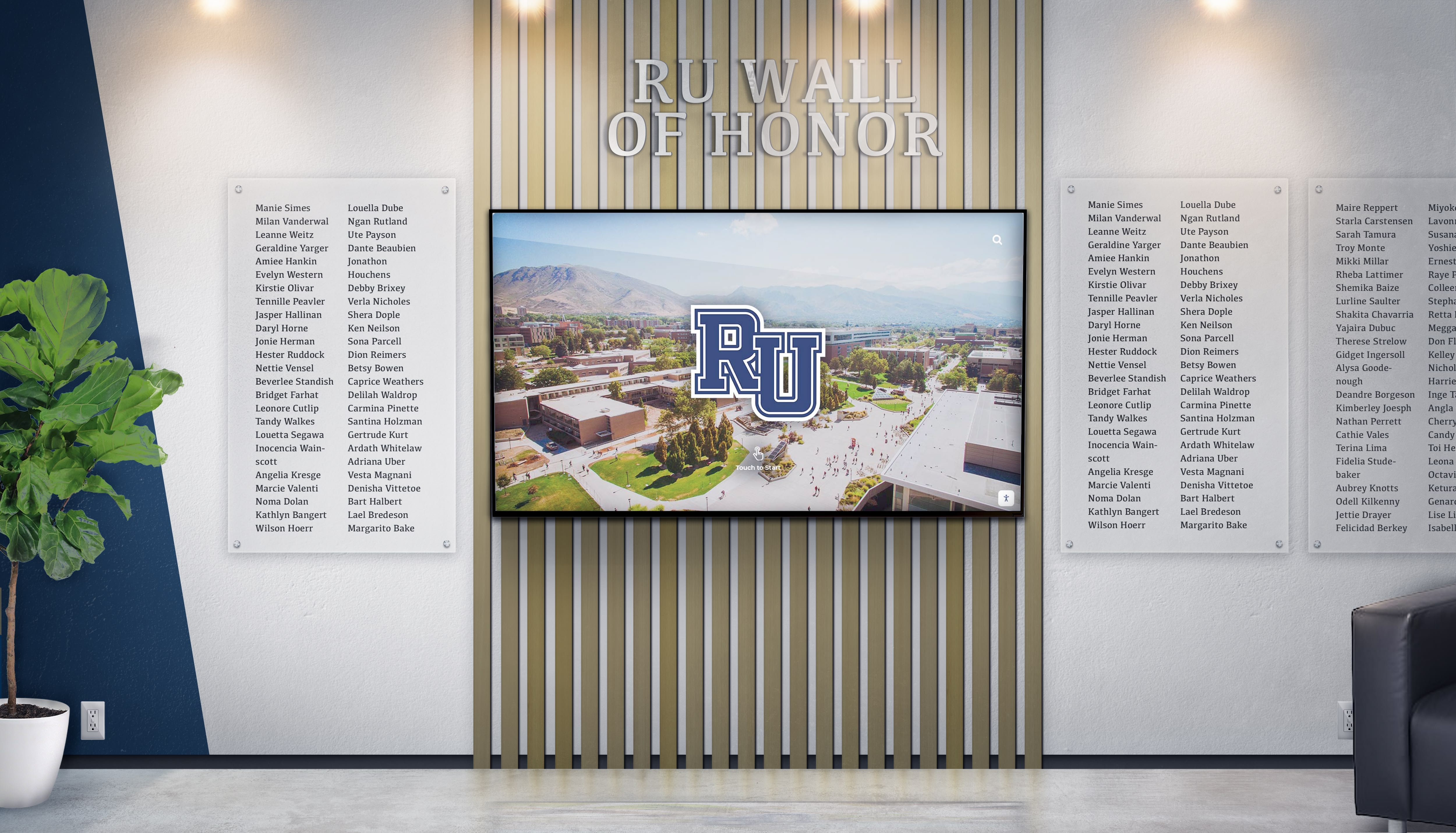
Integrated recognition systems combine digital displays with traditional elements creating comprehensive celebration spaces
Connecting Recognition to Recruitment and Retention
Strategic recognition strengthens forensics programs through enhanced recruitment and improved competitor retention.
Attracting New Competitors
Visible championship recognition helps recruit students to forensics programs:
- Prospective participants see clear achievement pathways and success opportunities
- Championship displays demonstrate program quality and competitive excellence
- Recognition provides conversation starters for recruitment presentations
- Parent communication highlights achievement value and college application benefits
- Middle school recruitment events showcase high school championship success
- Community visibility elevates program prestige making participation desirable
Retaining Current Competitors
Recognition reinforces participation value, improving multi-year commitment:
- Tiered recognition ensures all competitors can achieve some acknowledgment
- Visible celebration makes students feel valued for competitive contributions
- Success stories inspire persistence through inevitable tournament losses
- Championship documentation provides college application and scholarship content
- Community support built through recognition strengthens belonging and commitment
- Achievement visibility elevates program status within school culture
Programs with strong recognition systems typically experience higher sustained participation compared to those with minimal acknowledgment, directly impacting competitive success through deeper team rosters and experienced competitor retention.
Explore retention strategies in homecoming festivities school celebrations that build school pride and engagement.
Measuring Forensics Recognition Program Success
Regular assessment demonstrates recognition value and guides continuous improvement ensuring displays achieve intended objectives.
Quantitative Engagement Metrics
Digital Platform Analytics
Modern recognition systems provide concrete engagement data:
- Display interaction frequency and average exploration session duration
- Most-accessed content revealing audience interests and priorities
- Search patterns showing how users navigate championship documentation
- Peak usage times informing content scheduling and update strategies
- Geographic access patterns revealing alumni and family engagement levels
- Social sharing frequency demonstrating organic promotional reach
- Web platform traffic sources and referral patterns
These metrics reveal whether championship recognition generates intended engagement or requires strategy adjustments increasing effectiveness.
Program Impact Indicators
Schools can track forensics program metrics potentially influenced by championship recognition:
- Program participation numbers and enrollment trends
- Competitor retention rates across multiple seasons
- Tournament performance improvement and championship qualification frequency
- Community attendance at forensics events and demonstrations
- Booster organization membership and fundraising success
- Alumni engagement through forensics connections and program support
- Student body awareness of forensics program and competitive achievements
Positive trends following recognition implementation suggest displays contribute to program growth and community support development.
Qualitative Impact Assessment
Stakeholder Feedback Collection
Regular feedback provides improvement insights beyond quantitative metrics:
- Competitor assessment of whether recognition appropriately honors championships
- Coach evaluation of recognition impact on recruiting and program culture
- Alumni reflection on connection to program through recognition
- Family perception of celebration adequacy for student achievements
- Community member feedback on program visibility and appreciation
- Administrative assessment of recognition contribution to institutional goals
This qualitative feedback reveals whether recognition achieves intended cultural impacts beyond engagement metrics alone.
Observable Cultural Changes
Long-term shifts provide evidence of recognition cultural impact:
- Increased student body awareness and respect for forensics achievements
- Enhanced forensics program prestige within school culture hierarchy
- Strengthened alumni connections to current competitive programs
- Improved community understanding and support for academic competition
- Greater administrative commitment to forensics program resources
- Elevated competitive expectations among program participants
- Stronger program identity and championship tradition development
Regular observation enables continuous refinement ensuring championship recognition achieves intended goals while identifying enhancement opportunities.
Conclusion: Elevating Forensics Excellence Through Comprehensive Recognition
Speech and debate championship recognition represents strategic investment in competitive program culture, intellectual excellence celebration, and institutional values demonstration. When schools systematically honor forensics achievements through comprehensive recognition combining physical trophies, championship documentation, and innovative digital platforms—they transform temporary tournament victories into permanent legacies inspiring current competitors, honoring past champions, and demonstrating that academic competitive excellence receives prominence these extraordinary achievements deserve.
The strategies explored in this guide provide comprehensive frameworks for creating forensics championship recognition that honors intellectual athletic achievement while remaining sustainable, engaging, and aligned with program goals. From digital recognition platforms like Rocket Alumni Solutions that eliminate space constraints to systematic documentation approaches preserving complete championship stories, these strategies overcome traditional limitations while creating recognition experiences impossible with simple trophy cases or bulletin board announcements alone.
Transform Your Speech & Debate Recognition Program
Discover how modern digital recognition solutions can help you celebrate every championship, honor all competitors, and build lasting forensics traditions that inspire competitive excellence for generations.
Explore Recognition SolutionsBuilding effective championship recognition requires moving beyond limiting assumptions that brief announcements and crowded trophy cases adequately celebrate extraordinary forensics achievements. Digital platforms make comprehensive recognition achievable documenting complete competitive journeys rather than just displaying hardware, while systematic approaches ensure consistent implementation reaching all deserving competitors regardless of event category or tournament level.
Start where you are with recognition improvements you can implement immediately—whether better organizing existing trophy displays or exploring comprehensive digital recognition systems—then systematically expand to create celebration your championship competitors deserve. Every forensics student who receives meaningful recognition for their competitive contributions develops stronger program connection and greater motivation to pursue intellectual excellence.
Your speech and debate championships deserve celebration systems that honor the research dedication, competitive courage, and intellectual excellence required for tournament success. With thoughtful planning, appropriate technology investments, and consistent implementation, you can create recognition becoming treasured traditions preserving program legacy while inspiring next generations of forensics competitors to write their own championship stories.
Ready to begin? Explore how Rocket Alumni Solutions can help you create comprehensive speech and debate championship recognition that preserves competitive excellence while supporting the program growth and cultural goals essential to sustained forensics success.




































